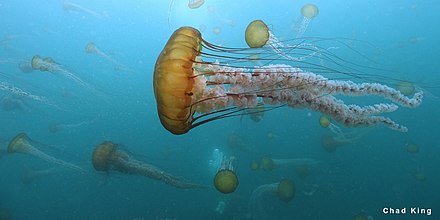Jellyfish are an ancient aquatic creature found in all oceans and freshwaters around the world. They have attracted much attention for their unique appearance and simple physiological structure. The following is detailed information and living habits of jellyfish:

Size: Jellyfish vary in size, with some species only a few millimeters in diameter, while other large species have canopy diameters up to more than 2 meters in diameter.
Tentacles: Most jellyfish have tentacles, which are covered with stinging cells and are used to capture prey and defend themselves.
Transparency: Jellyfish often have translucent bodies, and although they lack heads, torsos, and tails, their simple structure makes them excellent swimmers.
Geographical distribution: Jellyfish have a wide distribution range and mainly live in waters around the world, ranging from freshwater lakes to oceans.
Habitat: Different species of jellyfish have a variety of habitats, with some species living in shallow waters while others live in deeper marine environments.
Predation: Jellyfish feed on plankton, small fish and phytoplankton, usually capturing prey through stinging cells on their tentacles.
Swimming: Jellyfish can swim freely in the water through their own peristaltic motion. They are usually moved by the influence of ocean currents and tides.
Reproduction: Jellyfish have a complex reproductive cycle, which usually includes sexual reproduction and asexual reproduction. Some species of jellyfish reproduce multiple times during their growth cycle.
Toxicity: Some jellyfish have venomous tentacles, including some dangerous species, such as the box jellyfish, considered one of the most dangerous jellyfish in the world.
There are many species of jellyfish, covering all shapes and sizes. Some species are short-lived, while others are long-lived and may even be "immortal."
Jellyfish play an important role in the marine ecosystem. They are part of the food chain, filter large amounts of plankton, and help maintain the balance of the marine ecosystem.
Jellyfish have attracted much attention because of their unique appearance and biological characteristics. Although our knowledge of jellyfish is still limited, studying them can help to better understand the complexity of marine ecosystems and address the challenges of environmental change.
animal tags: jellyfish
We created this article in conjunction with AI technology, then made sure it was fact-checked and edited by a Animals Top editor.